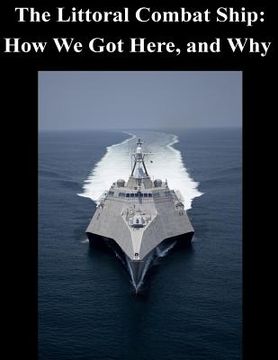Reseña del libro "The Littoral Combat Ship: How We Got Here, and Why (en Inglés)"
The Littoral Combat Ship (LCS) has been a controversial program from its inception, experiencing delays and cost overruns, not to mention severe criticism from elements of the national security community. Despite all this, every Chief of Naval Operations since Admiral Vern Clark has supported the program. To date, Navy attempts to defend the program have not succeeded in quieting the criticism, and the various technical and operational difficulties experienced by the first two examples have not helped matters. Perhaps the most serious objection to LCS is that the Navy charged into series production without having a clear idea of how the ship would be used. Undersecretary of the Navy Robert Work is known in Defense circles as a meticulous researcher who has a comprehensive grasp of Navy force structure and fleet architecture issues, stemming from his years as an analyst at the Center for Strategic and Budgetary Assessments. Secretary Work brings those same traits to bear in the preparation of this Newport Paper. In it he forthrightly chronicles the development of the LCS; not attempting to shy away from reporting on the program's vicissitudes nor trying to put a positive spin on Navy decisions along the way. Instead, he offers an informed view of how the logic behind LCS developed and evolved as the program progressed. As he so lucidly points out, LCS does not fit easily into the existing framework of Navy thought, and thus it is vulnerable to criticism by those who attempt to judge it by existing criteria. Secretary Work provides us with a better understanding of how LCS is to function in a networked battle force. While this explanation may not quiet all criticism, it at least brings much needed clarity to the story of how and why the LCS came to be. More than simply a history of the LCS program, this Newport Paper provides important insights into the dynamics of Navy programmatics and is therefore highly useful reading for anyone interested in understanding the Navy's acquisition process. In addition, and perhaps more importantly, if the reader pays attention to Secretary Work's discussion of how LCS might be used in "associated support" of a battle group, and thinks about it for a while, he or she will be rewarded with a glimpse of something that has been missing from the Navy's intellectual structure for a long time: naval operational art. Since at least the end of the Cold War, the Navy has organized its fighting capability into autonomous battle groups centered around aircraft carriers or amphibious ships. These "bubbles" of combat capability could be aggregated as they were in the three Middle East wars since 1990, but their aggregate capability was cumulative and did not propel the Navy into a qualitatively different mindset. Thus, as has been the case for most of its history, save World War II, the Navy has focused on tactics and on strategy, both of which it does rather well. The operational level, something that has been integral to Army doctrine since the 1980s, has been largely missing despite the efforts of the Naval War College to advocate its adoption. Introduction of the LCS, assuming the surface warfare community opens its mind to the full range of potential roles for smaller combatants, provides a practical basis for the development of a new naval operational art, oriented on combined arms.

